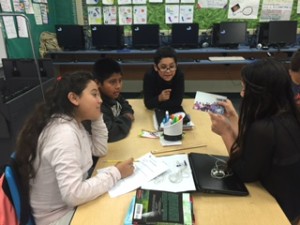 Students in the Rio School District are learning to be researchers, harvesting artifacts, conducting family oral history interviews, and engaging with community leaders about the history of the Mixteco population to understand and appreciate the diverse community they live in. This History Harvest project is part of a Teaching FAIR initiative designed and facilitated by Dr. Jacqueline Hundley Reid, Co-Director of Teachers for the Study of Educational Institutions (TSEI) as part of The Rio Indigenous Project (TRIP) and in collaboration with the Mixteco/Indigena Community Organizing Project (MICOP). Created by The University of Nebraska-Lincoln Department of History, for undergraduate students, and transformed into K-6 curriculum by Dr. Reid, the History Harvest project is an invitation to people to share their local historical artifacts, and their stories, for inclusion in a unique digital archive of what is known as “the people’s history.” In partnership with the university, TSEI is working with students and teachers to integrate a new kind of curriculum that collects, preserves, and shares the local communities’ rich histories.
Students in the Rio School District are learning to be researchers, harvesting artifacts, conducting family oral history interviews, and engaging with community leaders about the history of the Mixteco population to understand and appreciate the diverse community they live in. This History Harvest project is part of a Teaching FAIR initiative designed and facilitated by Dr. Jacqueline Hundley Reid, Co-Director of Teachers for the Study of Educational Institutions (TSEI) as part of The Rio Indigenous Project (TRIP) and in collaboration with the Mixteco/Indigena Community Organizing Project (MICOP). Created by The University of Nebraska-Lincoln Department of History, for undergraduate students, and transformed into K-6 curriculum by Dr. Reid, the History Harvest project is an invitation to people to share their local historical artifacts, and their stories, for inclusion in a unique digital archive of what is known as “the people’s history.” In partnership with the university, TSEI is working with students and teachers to integrate a new kind of curriculum that collects, preserves, and shares the local communities’ rich histories.
Background of History Harvest at Rio School District
Rio Real Elementary School
The project was first piloted two and a half years ago by then 5th grade teacher, Mr. Augustine Garcia at Rio Real Elementary School, facilitated by Dr. Reid, and with the valuable support of the school’s principal, Dr. Maria M. Hernandez. Dr. Reid provides a mentorship opportunity for teachers to develop this inquiry-based design project that supports the History-Social Science Content Standards, the Resolution for Respect for Indigenous Peoples, the Common Core State Standards, and the mandated FAIR Education Act (SB48). When asked about the experience, Mr. Garcia believed the project had a positive impact on the Mixtec students and their parents in his class. He stated, for example, that Mixtec students, “Judy and James (these names are pseudonyms for the students in the class) both opened up and contributed more in class…in math and cooperative groups” and the parents “were very happy that their kids were learning about their culture in school and they thought they would never see that.” Dr. Hernandez stated, “I have no doubt in my mind that it (the History Harvest project) had a positive impact on the students…” She explained the value to students, specifically that, “Their contributions were so valuable that the teacher took time out to study it in the classroom.” She further explained, “The confidence it gives our students once we start recognizing their contributions, their culture contributions, their language contributions…is to allow students to have confidence in their language background.”
In a short period of time, the program has grown organically to include more teachers from across three different schools in the district. Last year, 5th grade teacher, Ms. Katie Auerbach, who replaced Mr. Garcia when he moved to a new school in the Rio District, decided to launch the program in her classroom. She saw an immediate positive impact of the project as it provided a space to develop a more inclusive classroom that supports the diversity in all students. She stated, “I’m also seeing it (positive impact) on the playground as well. Whereas before (the Mixtec students) Steve, Sandra, and Fernando (these names are pseudonyms for the students in the class) mainly stuck to themselves and played in their small group… now I am seeing them involved in the “girls vs. boys” tag that all the students play at lunch and recess. Very powerful stuff…I’m getting a general consensus the other students see the Mixteco students now in a new light, and that it’s “cool” to speak or be able to understand Mixtec.” Since the program was such a success, both academically and in the development of a more inclusive classroom, Ms. Auerbach chose to continue to implement the program and sustain her collaboration with Dr. Reid, in an effort to find new ways to expand and extend the project academically and culturally as well as incorporating new technology and digital learning skills to the lessons.
Rio Lindo Elementary School
Last year, Mrs. Sylvia Contreras, 2nd Grade teacher at Rio Lindo Elementary School, chose to also pilot the program. She states, “I believe that my students have developed a respect for the diversity of others. They feel empowered, proud, more knowledgeable of their own culture, and that of the Mixtec culture…I have acquired first-hand knowledge and experience of the Inquiry-Based Learning Project… process; the planning, preparation, and successful implementation…”
This year Principal Veronica Rauschenberger at Rio Lindo Elementary School supported the development of the first second grade 3-teacher team to participate in the project together, consisting of returning teacher and lead, Mrs. Sylvia Contreras, along with Mrs. Nancy Pearson, and Mrs. Mireya Chavez. Additionally, 4th grade teacher Mr. Leif Lapiad is launching the program for the first time this year at Rio Lindo Elementary School.
Rio Plaza Elementary School
Principal Mr. Robert Guynn of Rio Plaza is very supportive of this mentoring program that supports inquiry-based learning and the development of academic and cultural literacies. This year 1st grade teacher, Mrs. Sandra VonCannon-Legaspi is launching the program.
Please follow the History Harvest Photo Gallery and Blog to learn about more about the different aspects of the program. For more information visit http://teachingfair.org/student-projects/ or contact Jacqueline Reid.


